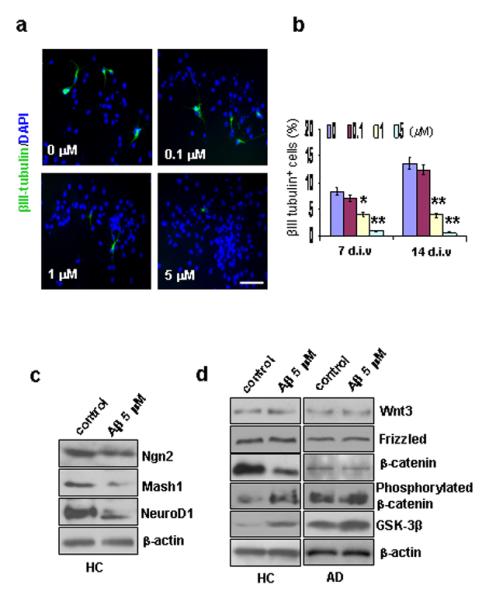Figure 7.

Effect of Aβ treatment on neurogenesis and β-catenin signaling. HC GPC neurospheres were treated with different concentrations of Aβ1-42 peptide for 2 days. Then, the Aβ was removed, and the cultures were tested after either 7 or 14 days in differentiation medium. (a). After 7 days of differentiation, immunostaining revealed a dose-related reduction in the percentage of neurons (βIII tubulin+) among the Aβ-treated HC GPC progeny (labeled with DAPI). Scale bar: 50 μm. (b). Quantification of immunoreactive structures after 7 and 14 days of differentiation showed that the percentage of new neurons among HC GPC progeny decreased significantly with ≥ 1.0 μM Aβ1-42 exposure compared to controls (0 μM Aβ1-42). (c). A representative Western blot of HC GPC progeny treated with 5 μM of Aβ1-42 revealed reduced levels of proneural gene products Ngn2, Mash1, and NeuroD1 compared to control HC progeny. (d). HC and AD GPCs were treated with 5 μM of Aβ1-42 for 2 days, and the culture was extended to 7 days in Aβ-free differentiation medium. Western blot showed a reduction in non-phosphorylated β-catenin and increases in both GSK-3β and phosphorylated β-catenin in Aβ-treated HC GPC progeny compared to control progeny. In AD GPC progeny, the blot did not show any significant change in the levels of non-phosphorylated or phosphorylated β-catenin between the Aβ-treated and control progeny; however, the Aβ-treated AD GPC progeny did exhibit a significant increase in GSK-3β expression compared to control AD progeny. No significant differences in either Wnt3 or frizzled levels were observed between Aβ-treated and control progeny from HC or AD GPCs (n = 3).
